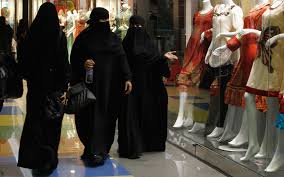There are no products in your shopping cart.
| 0 Items | £0.00 |

 SAUDI Arabia's crown prince Mohammad bin Salman has announced a radical change in the kingdom's conservative attitude towards women by decreeing that from now onwards they will be allowed to chose if they want to be covered in head to toe or not.
SAUDI Arabia's crown prince Mohammad bin Salman has announced a radical change in the kingdom's conservative attitude towards women by decreeing that from now onwards they will be allowed to chose if they want to be covered in head to toe or not.
By far the most conservative country in the world, Saudi Arabia has been ruled by fundamentalist Sharia law since 1929 that forces women to wear the black abaya, that covers their entire bodies. They are also banned from driving automobiles and can only work domestically.
However, with the recent ascent to power of young Prince Mohammad bin Salman, the kingdom has seen an expansion in women’s rights, including allowing women to attend mixed public sporting events and the right to drive cars from this summer. These changes have been hailed as proof of a new progressive trend toward modernisation in the deeply conservative Muslim kingdom.
Still, however, the gender-segregated nation continues to be criticised for its continued constraints on women. In a bid to move ahead faster and address these concerns, Prince bin Salam said that the law compelling women to wear the abaya will be changed to enable them chose if they want to adorn it or not.
He said: “The laws are very clear and stipulated in the laws of sharia that women wear decent, respectful clothing, like men. This, however, does not particularly specify a black abaya or a black head cover and the decision is entirely left for women to decide what type of decent and respectful attire she chooses to wear.”
Saudi Arabia has no written legal code to go with the texts making up sharia, but its police and judiciary have long enforced a strict dress code requiring Saudi women to wear abayas and in many cases to cover their hair and faces. Over the last year, the kingdom has witnessed a cautious new climate of social freedoms with the rise of the 32-year-old crown prince to power after decades of elderly rulers.
Saudi women have started wearing more colourful abayas in recent years, the light blues and pinks in stark contrast with the traditional black. Open abayas over long skirts or jeans are also becoming more common in some parts of the country.
On March 8, a group of women in the Saudi city of Jeddah marked International Women’s Day by exercising one of their newly acquired freedoms, the right to go for a jog, paying no heed to bemused onlookers. However, activists have blasted the country’s continued guardianship system requiring a male family member to grant permission for a woman to study abroad, travel and other activities.
Last week, a United Nations rights watchdog called on Saudi Arabia to end discriminatory practices against women, including male guardianship, and give them full access to justice.